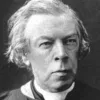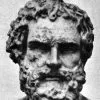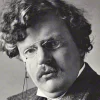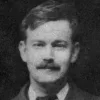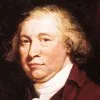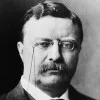It is not the fact that a man has riches which keeps him from the Kingdom of Heaven, but the fact that riches have him.
John Caird (1820-1898) Scottish theologian, academic, preacher
(Attributed)
I am unable to find the source of this quotation amongst Caird's writings (including of his many sermons). While he preaches in places on money and riches (e.g., "Covetousness a Misdirected Worship"), these phrases or ones like them do not show up in his works that I can find.
Nevertheless, this quotation was popularly requoted in the late 19th and early 20th centuries, beginning during Caird's lifetime. The earliest references I find are from 1878 --
The Pacific, Vol. 27, No. 17/1366 (1878-04-25) and (in quotations marks rather than italics) The Calcutta Indian Mirror (1879-05-18):Dr. Caird says it is not the fact that a man has riches which keeps him from the kingdom of heaven, but the fact that riches have him.
Christian Pioneer Magazine, "Gems," Vol. 23 (1878) and The Raleigh Christian Advocate (1879-02-05):It is not the fact that a man has riches which keeps him from the kingdom of heaven, but the fact that riches have him.
-- Dr. Caird
Even this point, the references are not to a story about Caird preaching or writing it, but column filler, indicating the quote was already in wide circulation. The use of quotes / italics suggests it might also be an excerpt from a more complex formulation.
By the turn of the century, the quote is fixed as above, and gains popularity in various quotation collections, including Hotchkiss, ed., Dictionary of Burning Words of Brilliant Writers (1895).
Citations for this phrase begin with attribution to "John Caird," "J. Caird," and "Dr. Caird," referencing the prominent Scottish theologian and preacher. After a time, only his last name is used. Starting mid-20th century (and as memory of John Caird fades), the attribution is often to David Caird (e.g., 1, 2, 3).
Quotations about:
materialism
Note not all quotations have been tagged, so Search may find additional quotes on this topic.
My friend, brag not yet of our American cousins! Their quantity of cotton, dollars, industry and resources, I believe to be almost unspeakable; but I can by no means worship the like of these. What great human soul, what great thought, what great noble thing that one could worship, or loyally admire, has yet been produced there? None: the American cousins have yet done none of these things.
Thomas Carlyle (1795-1881) Scottish essayist and historian
Essay (1850-02-01), “The Present Time,” Latter-Day Pamphlets, No. 1
(Source)
It is an insanity to get more than you want. Imagine a man in this city, an intelligent man, say with two or three millions of coats, eight or ten millions of hats, vast warehouses full of shoes, billions of neckties, and imagine that man getting up at four o’clock in the morning, in the rain and snow and sleet, working like a dog all day to get another necktie! Is not that exactly what the man of twenty or thirty millions, or of five millions, does to-day? Wearing his life out that somebody may say, “How rich he is!”
Robert Green Ingersoll (1833-1899) American lawyer, agnostic, orator
Speech (1886-11-14), “A Lay Sermon,” American Secular Union annual congress, Chickering Hall, New York City
(Source)
If you desire many things, many things will seem but a few.
Benjamin Franklin (1706-1790) American statesman, scientist, philosopher, aphorist
Poor Richard (1736 ed.)
(Source)
Any man with few needs appears a menace to the rich for he is always in a position to escape from them, and the tyrants see that thus they lose a slave.
[Tout homme qui a peu de besoins semble menacer les riches d’être toujours prêt à leur échapper. Les tyrans voient par là qu’ils perdent un esclave.]
Nicolas Chamfort (1741-1794) French writer, epigrammist (b. Nicolas-Sébastien Roch)
Products of Perfected Civilization [Produits de la Civilisation Perfectionée], Part 1 “Maxims and Thoughts [Maximes et Pensées],” ch. 3, ¶ 266 (1795) [tr. Mathers (1926)]
(Source)
(Source (French)). Alternate translations:Any man whose needs are few seems to threaten the rich with the possibility of his escaping them. Tyrants are thereby faced with the prospect of losing a slave.
[tr. Merwin (1969)]Any man who has few needs seems to threaten the rich with his readiness to escape from them. Thereby tyrants realize that they are losing a slave.
[tr. Pearson (1973)]Every man who has few needs seems to menace the wealthy with the constant threat of escaping from them. Tyrants see in such a proposition the loss of a slave.
[tr. Siniscalchi (1994)]Anyone whose needs are small seems threatening to the rich, because he's always ready to escape their control. This is how tyrants recognize that they're losing a slave.
[tr. Parmée (2003)]
We never understand how little we need in this world until we know the loss of it.
J. M. Barrie (1860-1937) Scottish novelist and dramatist [James Matthew Barrie]
Margaret Ogilvy, ch. 8 “A Panic in the House” (1896)
(Source)
A biographical work about his mother and family. He identifies this as a favorite saying of hers.
Trouble arises when either science or religion claims universal jurisdiction, when either religious dogma or scientific dogma claims to be infallible. Religious creationists and scientific materialists are equally dogmatic and insensitive. By their arrogance they bring both science and religion into disrepute. The media exaggerate their numbers and importance. The media rarely mention the fact that the great majority of religious people belong to moderate denominations that treat science with respect, or the fact that the great majority of scientists treat religion with respect so long as religion does not claim jurisdiction over scientific questions.
Freeman Dyson (1923-2020) English-American theoretical physicist, mathematician, futurist
“Progress in Religion,” Templeton Prize acceptance speech, Washington National Cathedral (9 May 2000)
(Source)
Many pleasant things are better when they belong to someone else. You can enjoy them more that way. The first day, pleasure belongs to the owner; after that, to others. When things belong to others, we enjoy them twice as much, without the risk of losing them, and with the pleasure of novelty. Everything tastes better when we are deprived of it.
[Muchas cosas de gusto no se han de poseer en propiedad. Más se goza de ellas ajenas que propias. El primer día es lo bueno para su dueño, los demás para los extraños. Gózanse las cosas ajenas con doblada fruición, esto es, sin el riesgo del daño y con el gusto de la novedad. Sabe todo mejor a privación.]
Baltasar Gracián y Morales (1601-1658) Spanish Jesuit priest, writer, philosopher
The Art of Worldly Wisdom [Oráculo Manual y Arte de Prudencia], § 264 (1647) [tr. Maurer (1992)]
(Source)
(Source (Spanish)). Alternate translations:Many things that serve for pleasure, ought not to be peculiar. One enjoys more of what is another's, than of what belongs to himself. The first day is for the Master, and all the rest for Strangers. One doubly enjoys what belongs to others, that's to say, not only without fear of loss, but also with the pleasure of Novelty. Privation makes every thing better.
[Flesher ed. (1685), §263]Many things of Taste one should not possess oneself. One enjoys them better if another's than if one's own. The owner has the good of them the first day, for all the rest of the time they are for others. You take a double enjoyment in other men's property, being without fear of spoiling it and with the pleasure of novelty. Everything tastes better for having been without it.
[tr. Jacobs (1892)]Many of the things that bring delight should not be owned. They are more enjoyed if another's, than if yours; the first day they give pleasure to the owner, but in all the rest to the others: what belongs to another rejoices doubly, because without the risk of going stale, and with the satisfaction of freshness; everything tastes better after fasting.
[tr. Fischer (1937)]
They tell me thou art rich, my country: gold
In glittering flood has poured into thy chest;
Thy flocks and herds increase, thy barns are pressed
With harvest, and thy stores can hardly hold
Their merchandise; unending trains are rolled
Along thy network rails of East and West;
Thy factories and forges never rest;
Thou art enriched in all things bought and sold!But dost thou prosper? Better news I crave.
O dearest country, is it well with thee
Indeed, and is thy soul in health?
A nobler people, hearts more wisely brave,
And thoughts that lift men up and make them free, —
These are prosperity and vital wealth!Henry Van Dyke (1852-1933) American clergyman and writer
“America’s Prosperity” (1 Oct 1916), The Red Flower: Poems Written in War Time (1917)
(Source)
Men use up their lives in heart-breaking political struggles, or get themselves killed in civil wars, or tortured in the secret prisons of the Gestapo, not in order to establish some central-heated, air-conditioned, strip-lighted Paradise, but because they want a world in which human beings love one another instead of swindling and murdering one another. And they want that world as a first step. Where they go from there is not so certain, and the attempt to foresee it in detail merely confuses the issue.
George Orwell (1903-1950) English writer [pseud. of Eric Arthur Blair]
“Can Socialists Be Happy?” Tribune (1943-12-20) [as John Freeman]
(Source)
By convention sweet is sweet, by convention bitter is bitter, by convention hot is hot, by convention cold is cold, by convention color is color. But in reality there are atoms and the void. That is, the objects of sense are supposed to be real and it is customary to regard them as such, but in truth they are not. Only the atoms and the void are real.
[νόμωι (γάρ φησι) γλυκὺ καὶ νόμωι πικρόν, νόμωι θερμόν, νόμωι ψυχρόν, νόμωι χροιή, ἐτεῆι δὲ ἄτομα καὶ κενόν]
Democritus (c. 460 BC - c. 370 BC) Greek philosopher
Frag. 0 (Diels) [tr. Bakewell (1907)]
(Source)
Cited to Tetralogies of Thrasyllus, 9; Sext. Emp. Math VII 135. Alternate translations:
- "Sweet exists by convention, bitter by convention, colour by convention; atoms and Void (alone) exist in reality ... We know nothing accurately in reality, but (only) as it changes according to the bodily condition, and the constitution of those things that flow upon (the body) and impinge upon it." [tr. Freeman (1948), frag. 9]
- "By convention sweet is sweet, bitter is bitter, hot is hot, cold is cold, color is color; but in truth there are only atoms and the void." [tr. Durant, from Bakewell]
The brain is only three pounds of blood, dream, and electricity, and yet from that mortal stew come Beethoven’s sonatas. Dizzy Gillespie’s jazz. Audrey Hepburn’s wish to spend the last month of her life in Somalia, saving children.
Diane Ackerman (b. 1948) American poet, author, naturalist
A Natural History of Love, “Brain-Stem Sonata: The Neurophysiology of Love” (1994)
(Source)
Making money ain’t nothing exciting to me. … You might be able to buy a little better booze than some wino on the corner. But you get sick just like the next cat, and when you die you’re just as graveyard dead as he is.
The aim of life is appreciation; there is no sense in not appreciating things; and there is no sense in having more of them if you have less appreciation of them.
Gilbert Keith Chesterton (1874-1936) English journalist and writer
The Autobiography of G. K. Chesterton (1936)
(Source)
And the Grinch, with his grinch-feet ice-cold in the snow,
Stood puzzling and puzzling: “How could it be so?
“It came without ribbons! It came without tags!
“It came without packages, boxes or bags!”
And he puzzled three hours, till his puzzler was sore.
Then the Grinch thought of something he hadn’t before!
“Maybe Christmas,” he thought, “doesn’t come from a store?”
“Maybe Christmas … perhaps … means a little bit more?”Dr. Seuss (1904-1991) American author, illustrator [pseud. of Theodor Geisel]
How the Grinch Stole Christmas (1957)
(Source)
But beware you be not swallowed up in books: An ounce of love is worth a pound of knowledge.
John Wesley (1703-1791) English cleric, Christian theologian and evangelist, founder of Methodism
Letter to Joseph Benson (7 Nov 1768)
(Source)
Poverty of goods is easy to cure, poverty of soul impossible.
[La pauvreté des biens, est aisée à guerir, la pauvreté de l’ame, impossible.]
Michel de Montaigne (1533-1592) French essayist
Essays, Book 3, ch. 10 “Of Managing the Will [De mesnager sa volonté]” (1586) (3.10) (1595) [tr. Frame (1943)]
(Source)
In context, "poverty of the soul" is given by Montaigne, not as a moral failing, but as the soul-felt sense of poverty, of not having enough, of needing to attain more.
The essay, including this passage, first appeared in the 2nd ed. (1588).
(Source (French)). Alternate translations:Want of goods may easilie be cured, but the poverty of the mind, is incurable.
[tr. Florio (1603)]The Want of Goods, is easily repair'd; but the Poverty of the Soul is irreparable.
[tr. Cotton (1686)]The poverty of goods is easily cured; the poverty of the soul is irreparable.
[tr. Cotton/Hazlitt (1877)]Poverty in worldly goods is easy to cure; poverty of the soul, impossible.
[tr. Ives (1925)]To cure poverty of possessions is easy: poverty of soul impossible.
[tr. Screech (1987)]Poverty of possessions may easily be cured, but poverty of soul never.
[Source]
By fixing men’s minds, not upon the discharge of social obligations, which restricts their energy, because it defines the goal to which it should be directed, but upon the exercise of the right to pursue their own self-interest, it offers unlimited scope for the acquisition of riches, and therefore gives free play to one of the most powerful of human instincts. To the strong it promises unfettered freedom for the exercise of their strength; to the weak the hope that they too one day may be strong. Before the eyes of both it suspends a golden prize, which not all can attain, but for which each may strive, the enchanting vision of infinite expansion. It assures men that there are no ends other than their ends, no law other than their desires, no limit other than that which they think advisable. Thus it makes the individual the center of his own universe, and dissolves moral principles into a choice of expediences.
R. H. Tawney (1880-1962) English writer, economist, historian, social critic [Richard Henry Tawney]
The Acquisitive Century, ch. 3 “The Acquisitive Society” (1920)
(Source)
We make ourselves miserable by first closing ourselves off from reality and then collecting this and that in an attempt to make ourselves happy by possessing happiness. But happiness is not something I have, it is something I myself want to be. Trying to be happy by accumulating possessions is like trying to satisfy hunger by taping sandwiches all over my body.
Step by step they were led to things which dispose to vice: the lounge, the bath, the elegant banquet. All this in their ignorance they called civilisation, when it was but a part of their servitude.
[Idque apud imperitos humanitas vocabatur, cum pars servitutis esset.]
I am stressing that it is the force of ideas rather than the impact of material things that made us a great nation. It is my conviction, too, that only the power of ideas, of enduring values, can keep us a great nation. For, where there is no vision the people perish.
Most of us have achieved levels of affluence and comfort un-thought of two generations ago. We’ve never had it so good, most of us. Nor have we ever complained so bitterly about our problems. The closed circle of materialism is clear to us now — aspirations become wants, wants become needs, and self-gratification becomes a bottomless pit. All around us we have seen success in the world’s terms become ultimate and desperate failure.
The excellence of a gift lies in its appropriateness rather than in its value.
Charles Dudley Warner (1829–1900) American essayist and novelist
Backlog Studies, Eleventh Study (1872)
(Source)
The means by which we live have outdistanced the ends for which we live. Our scientific power has outrun our spiritual power. We have guided missiles and misguided men.
Martin Luther King, Jr. (1929-1968) American clergyman, civil rights leader, social activist, preacher
Strength to Love, ch. 7 “The Man Who Was a Fool,” sec. 3 (1963)
(Source)
It is a bad thing for a nation to raise and to admire a false standard of success; and there can be no falser standard than that set by the deification of material well-being in and for itself.
Theodore Roosevelt (1858-1919) American politician, statesman, conservationist, writer, US President (1901-1909)
Speech (1910-04-23), “Citizenship in a Republic [The Man in the Arena],” Sorbonne, Paris
(Source)
I know a great many rich men and I have read about a great many others, and I do not envy them. They are no happier than I am. You see, after all, few rich men own their property. The property owns them. It gets them up early in the morning. It will not let them sleep; it makes them suspect their friends. Sometimes they think their children would like to attend a first-class funeral. Why should we envy the rich?
Our life on earth is, and ought to be, material and carnal. But we have not yet learned to manage our materialism and carnality properly; they are still entangled with the desire for ownership.
To believe that if we could have but this or that we would be happy is to suppress the realization that the cause of our unhappiness is in our inadequate and blemished selves. Excessive desire is thus a means of suppressing our sense of worthlessness.
Eric Hoffer (1902-1983) American writer, philosopher, longshoreman
The Passionate State of Mind, Aphorism 6 (1955)
(Source)
Countries like ours are full of people who have all the material comforts they desire, yet lead lives of quiet (and at times noisy) desperation, understanding nothing but the fact that there is a hole inside them and that however much food and drink they pour into it, however many motorcars and television sets they stuff it with, however many well-balanced children and loyal friends they parade around the edges of it, however much contentment they place between it and their own consciousness, it aches.
Most people seek after what they do not possess and thus are enslaved by the very things they want to acquire. They become prisoners of their desires even though they appear to be free.

